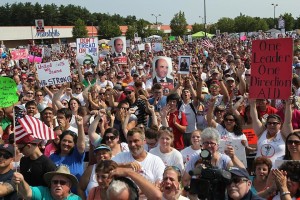As Background…
Market Basket is a large regional supermarket chain in the New England area consisting of over 25,000 employees at 71 locations. Originally called DeMoulas, it started out as a small “mom and pop” grocery store by Greek immigrants in 1916 in Lowell, Massachusetts. The store was sold to two DeMoulas sons, Mike and George, in 1954 who transformed the store into a modern supermarket chain. When George died unexpectedly, Mike became the sole head of DeMoulas, and a family feud began. George’s family claimed that Mike defrauded them by moving assets around which further fueled the fire. A judge ruled that George’s family was defrauded out of $500 million by Mike, causing 51% of the DeMoulas’ stock being transferred to George’s family.
Family Feud Makes for Bad Management
The family feud has continued over the years, and doesn’t appear to be stopping anytime soon. Arthur T. DeMoulas was elected as the president of the corporation by the board in 2008. During his time as president he has opened four to five new stores each year, as well as renovating and relocating stores to keep them updated. In one year Market Basket sales grew from just under $3 billion a year to over $4 billion. Arthur T. had been very focused on keeping the human element in the grocery stores and didn’t want self-checkout or other aspects that would take away from that creating a strong customer following. By all accounts, Arthur T. cared deeply about his employees, showed empathy, rewarded them well, and was universally loved by the workforce. However, the feuding family members on the board felt differently and said that Arthur T. was defiant and was dictatorial in his management style toward them.
A Change in Alliance
The board of seven is made up by four DeMoulas family members and three independent members; the shift of one alliance was a major factor in the ousting of Arthur T. DeMoulas. Rafaela Evans is the window of Evans DeMoulas, the brother of Arthur S. DeMoulas. Evans recently shifted her alliance towards Arthur S. which led to a tip of the scale in his favor. While the board alliance has shifted its direction, it does not appear the employees or customers feel the same way. There was a crowd of about 7,000 people at a rally to support Arthur T. and the eight executives who were fired. Employees are risking their jobs, and customers are taking their business elsewhere until their beloved CEO is reinstated. The board has replaced Arthur T. by hiring James Gooch, former CEO of Radio Shack, and Felicia Thornton, former executive of Albertsons.
Leadership Lessons Learned from Market Basket
1. Disadvantages of a Dual-CEO
There is no public face to the company. Since Arthur T. has been ousted, the board has since hired two CEOs: Jim Gooch and Felicia Thornton, which means there is no ‘single’ face of the business. The challenges with dual CEO’s are many (why else would 99% of organizations have a single CEO?), not the least of which is lack of a public single face of leadership. Worse, by all public accounts, it appears that both CEO’s tend to be introverted types. If not, where have they been?
2. Public Firings
Suggestion to Market Basket executives – Public firing of employees is never a great path towards engaging the workforce! A major component of involuntary turnover within a company is the mourning stage for its employees, especially when a beloved leader is let go. Market Basket’s employees were not given the proper time to understand what happened with their senior leader, and were forced to accept drastic changes without clear communication. Worse, shortly after Arthur T. was ousted from his CEO position at Market Basket, a number of additional managers were unceremoniously fired. The mourning process was interrupted and has now caused major protests and significantly slowed down (or stopped) operations, which is costing Market Basket millions of dollars a day.
3. Public Relations
Media outreach has been extremely limited by Market Basket executives aside from a few newspaper advertisements requesting that employees return to work ‘for the customers’. Note to Market Basket executives – customer services STARTS with engaging your employees, not the other way around. A public outreach demanding employees return to work to service customers backfired. Even customers were put off by their attempt at public relations. There has been one group of stakeholders who have been successful at public and media relations – workers who are protesting and no longer showing up to work in order to support Arthur T. They have been joined by highly engaged customers who have attended rallies and are taking their business elsewhere. The very limited communication and outreach from the leadership team at Market Basket has allowed the situation to get out of hand and they will now have to take stronger actions than originally anticipated. Trust by the employees was already compromised when the board ousted Arthur T., now the leadership is failing to communicate and it is simply furthering the mistrust, which will be very difficult, if not impossible, to get back.
Sources:
History of Market Basket
A switch in allegiance, and Market Basket dominoes began to fall, Lowell Sun.
Market Basket workers rally in Tewksbury for ‘Artie T.’, Boston Globe.
-Kaitlyn Carr, Organizational Development Specialist, @kacarr789, @emplyeengagement



